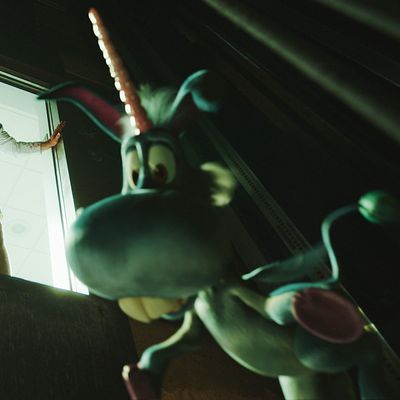
At once trivial and dire, SyFy’s Happy! is another one of those comic-book-inspired nihilist action-comedies that turns the carefully developed aesthetic of film noir, one of this country’s greatest cultural achievements, into a series of winking macho poses. It’s set in a rainy, grimy, dystopian metropolis. Criminal gangs rule a town in near ruins. Almost all the cops are corrupt. Sickos in wild costumes kidnap children and get blow jobs from streetwalkers they’re about to kill. Every five minutes, there’s a bloody fight or massive shoot-out in public. The body count is in the double digits in the pilot alone, but none of the violence has any weight, except as a visual punch line. There’s nothing new in any of the situations. And the plot, which requires a corrupt and substance-addled ex-cop (Christopher Meloni) to rescue a kidnapped girl with help from her imaginary friend, Happy (an animated flying unicorn, voiced by Patton Oswalt), is your standard-issue, Sin City/Suicide Squad/Preacher–style “hard-boiled” experience.
I know a lot of folks love this brand of TV-MA bubblegum noir because it speaks to them, for whatever reason. There was a time when it spoke to me, too. But it just doesn’t anymore, and whenever I encounter it now, I think, “Please not this again.” As much as I admired Bryan Fuller’s American Gods, a more rarified journey into this pop-culture terrain, I cared not one whit for the long scenes of Quentin Tarantino–esque macho posturing capped by explosions of gory brutality, because it all felt like a lot of reheated cultural leftovers, no matter how the filmmakers tried to spice it up. Preacher and Ash vs. Evil Dead: same problems, different virtues. (Yes, I know Preacher and Happy! are based on well-regarded graphic novels and American Gods is based on a well-regarded novel-novel and Ash is derived from the Evil Dead films, which I owned on VHS during the analog years. The pedigree doesn’t matter. Don’t @ me.)
All that being said, series co-creators and co-writers Grant Morrison (author of the source material) and Brian Taylor (of the Neveldine and Taylor action pictures) are undeniable virtuosos who specialize in this kind of material. Mixing dreams, fantasies, drug-fueled hallucinations, multimedia flourishes, comic-book-styled vertical split screens, and Dutch-tilted eruptions of mayhem, Happy! communicates such joy in filmmaking that the show seems graceful and airy even though the material is mostly leaden. If you’re able to view Happy! mainly as an exercise in style and attitude, with a brilliant lead performance, you’ll find a lot to admire here. Although, as I’ve warned, the continual jocular brutality tends to sour the project whenever it’s on the verge of becoming delightful.
As Nick Sax, the ex-cop trying to liberate sweet little kids who’ve been crated in a dungeon basement by a psychotic Santa Claus, Meloni gives one of the greatest comic-action performances I’ve seen, up there with Bruce Willis in Die Hard and Twelve Monkeys, Harrison Ford in the Indiana Jones films, Burt Lancaster in The Train, and Jason Statham in the Crank movies (which were co-directed by Neveldine and Taylor, and supplied probably 75 percent of the look and style of Happy!).
This is, to put it mildly, not the kind of performance that wins awards, though if there were any justice it would. When you consider all the challenges that Meloni is presented with here, it’s astonishing that he’s able to seem so comfortable and unaffected in every frame he inhabits. From the instant Meloni’s face appears onscreen, you believe in this fundamentally ridiculous character, a disgraced, puffy-eyed, constantly drunk or drug-addled ex-cop who can kill any number of people effortlessly with guns, knives, his bare hands, and whatever household objects happen to be available. Meloni plays this character as a man who knows how preposterous he is and how far he’s fallen, but has decided to just enjoy the ride, no matter how bizarre or horrific it becomes. There’s zero vanity in this performance. He spends a good portion of the first episode running around in a flapping hospital gown. His hair has been slicked back in a way that doesn’t merely acknowledge his receding hairline, but perversely celebrates it. I have no idea what he did to make his voice sound the way it does; maybe he gargles with fish-tank gravel.
Once Happy becomes visible to Sax, Meloni carries on running conversations with an actor he can’t see and whose actual voice and physical presence was supplied during postproduction. (Patton Oswalt is a marvelous character actor, and he gives his all here, but I wish they’d cast someone else in this part; he’ll always be Remy from Ratatouille to me.) Meloni has to argue with his invisible scene partner while running for his life, being resuscitated after a heart attack, and enduring torture by a gang of thugs (led by the excellent Patrick Fischler, who promises to slice Sax’s penis like a salami — good times). It’s as if Mickey Rourke’s character from Sin City had been pasted into Who Framed Roger Rabbit.
Even when the story and dialogue disappoint, which is pretty much continually, the filmmaking and Meloni’s performance never do. The interaction between camera subject and camera is so intuitive that it often feels as if the shots are being dictated by Meloni’s expressions and gestures. The broad brushstrokes are a kick — Sax’s close-up expressions of confusion and agony are always a slapstick treat — but it’s the little details that dazzle. Late in the first episode, Sax starts running in a bow-legged way, like a man who is trying not to lose control of his bowels, which you might reasonably assume is just a thing Meloni decided to do for kicks. Lo and behold, at the start of the next episode, Sax confesses that he’s suffering from “a baseball-sized colonic impasse.” Method, baby.


